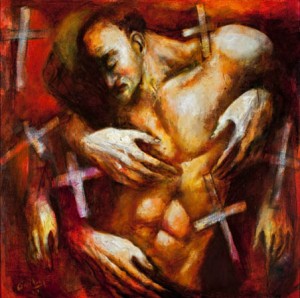Blue hermit does not publish the names of donors. You all know who you are and God knows who you are. Thank you very much and may the Lord continue to pour out the flame of His love into you hearts.
Help is still needed in order to purchase medicines and supplies so we can keep the inventory on line.
As Christmas approaches what better Christmas gift can one give than to help the sick poor. By helping these folks with medicines and medical care they are able to use the money that would normally be spent for the medical supplies to buy food for their families.
My love and prayers go out to all of you,
brother dismas Mary
^^^^^^^^^^^^^^^^^^^^^^^^^^^^^^^^^^^^^^^^^^^^^^^^^^^^^^^^^^^^^^^^^^^^^^^^^^^^^^^^^^^^^^^^^^^^^^^^^^^^
The treatise of St Augustine against Faustus
| We celebrate the martyrs with love and fellowship |
|---|
 |
|---|
We,
the Christian community, assemble to celebrate the memory of the
martyrs with ritual solemnity because we want to be inspired to follow
their example, share in their merits, and be helped by their prayers.
Yet we erect no altars to any of the martyrs, even in the martyrs’
burial chapels themselves.
No bishop, when celebrating at an altar where these
holy bodies rest, has ever said, “Peter, we make this offering to you,”
or “Paul, to you,” or “Cyprian, to you.” No, what is offered is offered
always to God, who crowned the martyrs. We offer in the chapels where
the bodies of those he crowned rest, so the memories that cling to those
places will stir our emotions and encourage us to greater love both for
the martyrs whom we can imitate and for God whose grace enables us to
do so.
So we venerate the martyrs with the same veneration of
love and fellowship that we give to the holy men of God still with us.
We sense that the hearts of these latter are just as ready to suffer
death for the sake of the Gospel, and yet we feel more devotion toward
those who have already emerged victorious from the struggle. We honour
those who are fighting on the battlefield of this life here below, but
we honour more confidently those who have already achieved the victor’s
crown and live in heaven.
But the veneration strictly called “worship,” or latria,
that is, the special homage belonging only to the divinity, is
something we give and teach others to give to God alone. The offering of
a sacrifice belongs to worship in this sense (that is why those who
sacrifice to idols are called idol-worshippers), and we neither make nor
tell others to make any such offering to any martyr, any holy soul, or
any angel. If anyone among us falls into this error, he is corrected
with words of sound doctrine and must then either mend his ways or else
be shunned.
The saints themselves forbid anyone to offer them the
worship they know is reserved for God, as is clear from the case of Paul
and Barnabas. When the Lycaonians were so amazed by their miracles that
they wanted to sacrifice to them as gods, the apostles tore their
garments, declared that they were not gods, urged the people to believe
them, and forbade them to worship them.
Yet the truths we teach are one thing, the abuses
thrust upon us are another. There are commandments that we are bound to
give; there are breaches of them that we are commanded to correct, but
until we correct them we must of necessity put up with them.
No comments:
Post a Comment
Note: Only a member of this blog may post a comment.